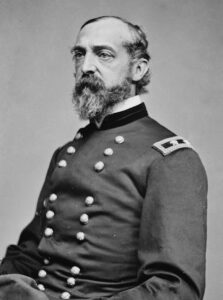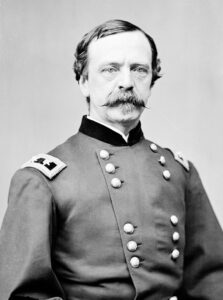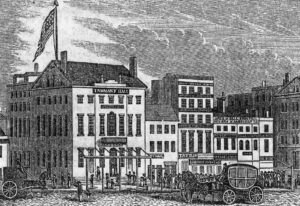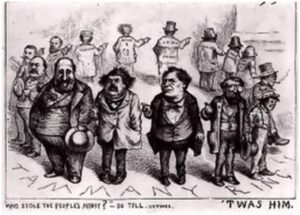
 Soldiers are trained to obey orders without thought of the moral aspects the order might have carried. Nevertheless, not every order is a good one. Still, there have been a number of times when disobeying an order was very questionable, such as the order given to General Daniel Sickles at the Battle of Gettysburg. Sickles was a Tammany Hall politician with ambitions of becoming president. Tammany Hall, which was also known as the Society of Saint Tammany, the Sons of Saint Tammany, or the Columbian Order, was an American political organization founded in 1786 and incorporated on May 12, 1789, as the Tammany Society. In New York City and New York state politics, and it had become the main local political machine of the Democratic Party. The Tammany Hall politicians focused on bringing immigrants, most notably the Irish, into American politics from the 1850s, and into the 1960s. Tammany Hall politicians virtually controlled the Democratic nominations and political patronage in Manhattan for over 100 years following the mayoral victory of Fernando Wood in 1854. These politicians used their patronage resources to build a loyal, well-rewarded core of district and precinct leaders, and after 1850, the vast majority were Irish Catholics due to mass immigration from Ireland during and after the Irish Famine of the late 1840s.
Soldiers are trained to obey orders without thought of the moral aspects the order might have carried. Nevertheless, not every order is a good one. Still, there have been a number of times when disobeying an order was very questionable, such as the order given to General Daniel Sickles at the Battle of Gettysburg. Sickles was a Tammany Hall politician with ambitions of becoming president. Tammany Hall, which was also known as the Society of Saint Tammany, the Sons of Saint Tammany, or the Columbian Order, was an American political organization founded in 1786 and incorporated on May 12, 1789, as the Tammany Society. In New York City and New York state politics, and it had become the main local political machine of the Democratic Party. The Tammany Hall politicians focused on bringing immigrants, most notably the Irish, into American politics from the 1850s, and into the 1960s. Tammany Hall politicians virtually controlled the Democratic nominations and political patronage in Manhattan for over 100 years following the mayoral victory of Fernando Wood in 1854. These politicians used their patronage resources to build a loyal, well-rewarded core of district and precinct leaders, and after 1850, the vast majority were Irish Catholics due to mass immigration from Ireland during and after the Irish Famine of the late 1840s.
With the outbreak of the American Civil War in 1861, Sickles raised a brigade with himself as its commander, hoping to improve his reputation, which had suffered greatly when he murdered his wife’s lover. On July 2, Sickles’s III Corps was ordered to defend a portion of Cemetery Ridge. This area included Little Round Top, and it was a central position between two other divisions. It seemed like the perfect strategy, but Sickles, feeling that the lay of the land made his position indefensible, asked Major General George S Meade for permission to advance three-quarters of a mile to the Emmitsburg Road. When Meade refused, Sickles ended up advancing, against a direct order, to the forward position anyway. That shift of position left his unit vulnerable to flanking attacks and also left Little Round Top undefended. Clearly, Sickles didn’t understand the strategies of war that were well known to Major General Meade. I guess soldiers are promoted for a reason.
Sickles was forced to retreat and lost almost 40% of his force in the Confederate attack that followed. After Sickles had abandoned his post, the task of defending Little Round Top fell to the 3rd Brigade, 1st Division, V corps, and in fact made famous the 20th Maine brigade, under Colonel Joshua Chamberlain. In the end, they famously managed to repel the Confederate advance, but the victory would not have needed the heroics if Sickles had stayed at his post. Of course, typical of those who rebel and ignore the orders given, Sickles 
 maintained to the end of his days that his insubordination helped the Army of the Potomac survive the day’s assaults. It was a crazy declaration, but I guess it helped him sleep at night. There are those on both sides of the coin on that one, but in the end, the disobedience cost him much more than he might have imagined, since he was never the president.
maintained to the end of his days that his insubordination helped the Army of the Potomac survive the day’s assaults. It was a crazy declaration, but I guess it helped him sleep at night. There are those on both sides of the coin on that one, but in the end, the disobedience cost him much more than he might have imagined, since he was never the president.


Leave a Reply